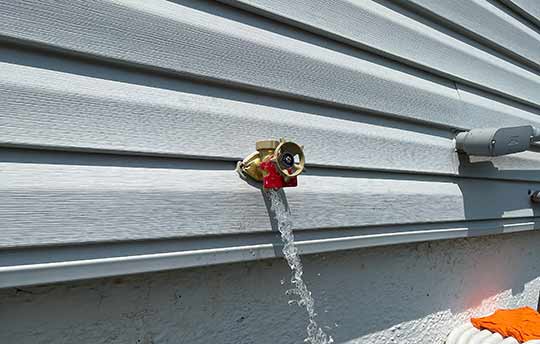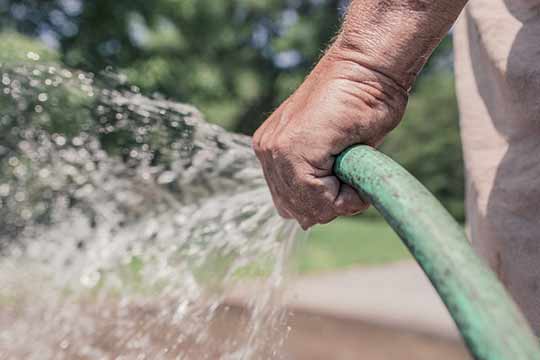
Winter can be a brutal and unforgiving season, especially when it comes to our homes and outdoor plumbing. One of the most vulnerable parts of our plumbing system during the winter months is the hose bibb, also known as an outdoor faucet or spigot. If not properly protected, the hose bibb can freeze and potentially cause costly damage to our plumbing system. In this article, we will discuss why it is important to protect your hose bibb from freezing this winter and provide you with some effective tips on how to do so.
Understanding the Risks
Before we dive into the various methods of protecting your hose bibb from freezing, let’s first understand the risks involved. When water freezes, it expands, and this expansion can cause pipes and faucets to crack or burst. A frozen hose bibb can lead to significant water damage and even more severe issues if not addressed promptly.
Furthermore, the hose bibb is prone to freezing because it is located on the exterior of our homes, exposed to the harsh cold temperatures and winds of winter. It is crucial to take proactive measures to safeguard this vulnerable component of our plumbing system.
Insulate and Cover Your Hose Bibb
One of the most effective ways to protect your hose bibb from freezing is by insulating and covering it. Insulation creates a barrier between the cold air and the faucet, reducing the likelihood of freezing. There are several ways you can insulate your hose bibb:
1. Foam Insulation Covers: These covers are specifically designed to fit over the hose bibb and provide protection against freezing temperatures. They are easy to install and are available in different sizes to accommodate various faucet designs. Foam insulation covers are an affordable and effective option for protecting your hose bibb.
2. Insulating Tape: Another option is to use insulating tape to wrap around the hose bibb. This tape has insulating properties and helps to prevent freezing. Make sure to wrap it tightly and cover the entire length of the faucet, including the valve and connecting pipes.
3. Insulating Caps: Insulating caps are designed to cover the entire faucet, including the handle. They provide comprehensive protection against freezing and are particularly useful in extremely cold climates. These caps create an additional layer of insulation and are easy to install and remove when needed.
Choose the insulation method that suits your needs and climate conditions best. Remember to remove the insulation once winter is over to prevent any potential damage to your faucet during warmer months.

Disconnect and Drain Your Hose
An important step in protecting your hose bibb from freezing is to disconnect and drain your hose before winter sets in. Leaving your hose attached to the faucet can trap water inside, leading to freezing and potential damage.
To properly disconnect and drain your hose, follow these steps:
1. Turn off the Water Supply: Locate the shut-off valve for your outdoor faucet and turn it off. This will prevent any further water flow to the hose bibb.
2. Disconnect the Hose: Unscrew the hose from the faucet, making sure to drain any residual water. Allow the hose to fully empty before storing it for the winter.
3. Drain the Faucet: Once the hose is disconnected, open the faucet and let any water drain completely. This step is crucial to ensure there is no water left inside the hose bibb or pipes.
By disconnecting and draining your hose, you eliminate any water that could potentially freeze and cause damage to your hose bibb or plumbing system.
Install a Frost-Free Hose Bibb
If you live in an area with harsh winters and want a long-term solution to protect your hose bibb, consider installing a frost-free hose bibb. These faucets are designed to prevent freezing by moving the valve mechanism inside your home, away from the exterior cold.
Here’s why a frost-free hose bibb is a great investment:
1. Year-Round Protection: Unlike traditional hose bibbs, frost-free models are designed to provide protection throughout the year. They have a specialized configuration that keeps the water valve inside your home’s heated space, preventing freezing even during the coldest winter days.
2. Easy to Operate: Frost-free hose bibbs operate just like regular outdoor faucets. They are simple to use and require no additional maintenance or effort to protect them from freezing. You can conveniently water your garden or wash your car without worrying about freezing issues.
3. Prevent Water Damage: By installing a frost-free hose bibb, you significantly reduce the risk of water damage caused by frozen pipes or leaks. It is a worthwhile investment that can save you from costly repairs in the long run.
Contact a local plumber to install a frost-free hose bibb in your home. They have the expertise and knowledge to ensure proper installation and to advise you on the best model to fit your needs.
Regular Maintenance and Inspection
Lastly, to keep your hose bibb in top condition and protect it from freezing, regular maintenance and inspection are essential. Here are some maintenance tips:
1. Check for Leaks: Periodically inspect your hose bibb for any leaks or drips. Even minor leaks can lead to freezing problems and should be addressed promptly.
2. Clear Debris: Remove any debris or dirt from around the hose bibb. This prevents blockages and ensures proper water flow.
3. Protective Measures: If you live in an area with extremely cold temperatures, consider using additional protective measures such as heat tape or heat cables. These devices provide constant low-level heat to prevent freezing during severe winter conditions.
By incorporating regular maintenance and inspections into your routine, you can extend the lifespan of your hose bibb and minimize the risk of freezing.
Conclusion
Protecting your hose bibb from freezing is crucial to avoid costly repairs and water damage during the winter months. By insulating and covering your faucet, disconnecting and draining your hose, considering a frost-free hose bibb, and performing regular maintenance, you can safeguard this vulnerable component of your plumbing system.
Remember, prevention is always better than cure when it comes to freezing pipes. Take the necessary precautions outlined in this article, and you can enjoy a worry-free winter without the risks of a frozen hose bibb.

